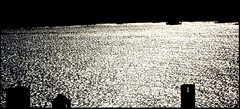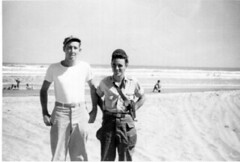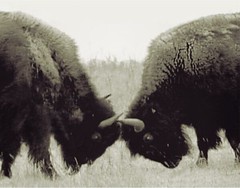Tuesday. Set off for the mountains, a vast forested area with funny topless trees. This phenomenon was whimsically but satisfactorily explained when I got to the monastery at the top of the mountain -- an opulent place (which my tour book magnanimously describes as “reputedly wealthy beyond dreams of avarice”) with gold mosaics on every wall and a surprisingly postmodern museum. When the icon of the Virgin with babe in arms, both in a distinctive position (the name of which the monastery shares), was brought up to the church, all the trees along the way bowed down in respect, and apparently, decided to stay that way.

On a ridge further up, next to the Archbishop’s creepily guarded grave (there’s a soldier, in the dark,
inside the mausoleum, standing on duty all day), is a place called the Seat of the Virgin. I was touched by a babybib tied to a tree there, along with a zillion other leavings of paper and ribbon, prayers each one, offerings, pleas.

Wednesday. Back on the bus. First stop: the furthest settlement in Free Outpost, which overlooks Occupied Outpost, its ghost towns and guard towers, foreign flags, fortunes in ruins, monuments to lives shattered and lives lost. I watched a film presentation in the Visitors’ Center, in English, with a group of Czech tourists; I held back tears for the whole generations that have waited, bags packed, to go home. It was very moving, very effective propaganda, put out by a country that, not knowing what else to do, has turned an unfortunate political situation into a tourist attraction. Free brochures were available in every language. I left them there. I don’t have to read a brochure to know that sense of waiting, the determination that doesn’t flag, the desperation, the futility.
From there we went to a charming seaside resort town that arose as a product of the occupation. Our main destination was a church, or more precisely half a church and half a cave, whose holy waters are said to have saved countless thirsty children whose cries would otherwise have given them and their families away, as they hid from the enemy within those walls. The members of my group went nuts, kissing icons and collecting bottles of water to bring back.

Next stop: the airport city. Slowly but surely we were getting closer to home. Spent the afternoon on foot, making the most of the free time allotted. I walked along the palm-treed beach, hot and cold by turns. Found the municipal gallery with an interesting (and free) exhibition by a prolific but repetitive local
artist, a castle, and finally, the Church of Lazarus, so named for Lazarus himself, whose second but not final resting place lies within. I had never thought about what happened to him after Christ raised him, but it wasn’t exactly “happily ever after.” First of all, his skin never quite recovered (it had started to yellow and rot, which was essential to the plausibility factor of the miracle), he was persecuted as a follower of Christ, kicked out of the holy land, and ended up in the Outpost. He arrived hungry and thirsty, cursed an old woman who refused him some grapes, and turned her vineyards into salt flats for all of eternity. Nice guy. At some point, his bones, all but one (part of his skull, if you really want to know), were removed from the church and sent back to Jerusalem. I saw the empty tomb down there in the catacombs, but I couldn’t bear to see the relic.
Final stop: another tomb, this one covered by three large stones and a green cloth embroidered in gold. I didn’t want to take my shoes off, so I respectfully stayed outside the mosque, toured the gardens, watched the members of my group make spectacles of themselves, but do no worse than what they had done in their own holy places.

Our guide bid us a heartfelt goodbye; she recited a poem that left us all moved and a little sentimental about leaving the Outpost still in the midst of its agona (sic)… until… we got to the chaos of the airport and were informed of a two-hour delay that turned into a four-hour delay. Sometimes a “rats” and a free sandwich aren’t enough.
But it gave me a chance to write all this, to make up a bit for all the pictures I wanted to take but didn’t. When my eyes fell on beauty, which happened all the time, I felt it so strong I had to turn away. My head tells me that the Outpost is a small, sad place (full stop). But when I was there, and now, it’s too much for me, too big an experience to reconcile with so short a summary. Maybe it’s me more than the Outpost -- the timing, the trouble with comms, the multitude of beautiful things that I can’t bear to look in the face. Some experiences put others in perspective, and some don’t change a thing.
(the end)














